Pets are part of the family. But unlike the rest of us, they don’t clean up after themselves. From litter-box aromas to that wet-dog scent on your couch, our furry friends can bring with them some less-than-lovely pet odours. So, how can you continue to live side by side with your four-legged best friend without living with the stench? Follow these simple steps to remove the smell of pets in your home.
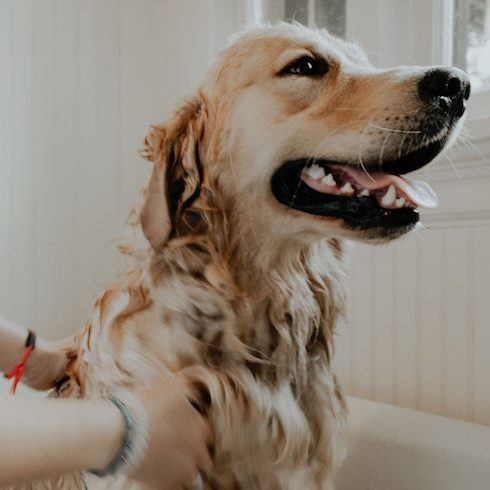
Bath Time
The easiest way to get pungent pet smells out of your home? Cut them off before they can set in. Maintain a regular bath schedule for your furry friend. This will vary depending on your pet’s fur, skin and specific needs. For a natural way to keep your pup clean, try making your own pet shampoo using uncooked oatmeal.
Keep in mind that animals, such as cats and rabbits, should not be bathed. Unless your cat has gotten legitimately dirty, wipe them down with a wet cloth, followed by a dry cloth immediately. Bunnies shouldn’t be bathed under any circumstance as they can go into shock. Again, use the wet-cloth-dry-cloth method.
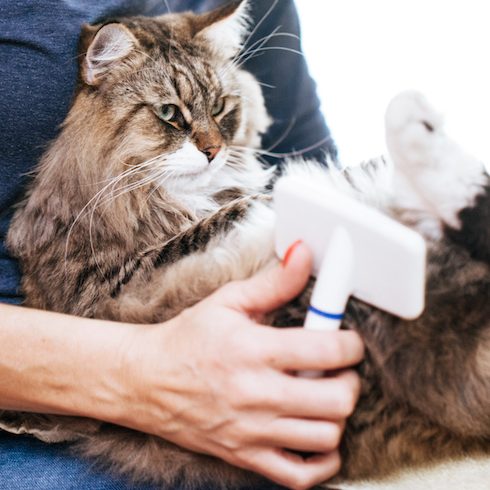
Prioritize Grooming
Similarly, a lot of unpleasant pet scents are spread through your animal’s fur, which they tend to shed constantly. Brushing your pet’s fur regularly (daily if possible) reduces the spread of pet smells around the house.
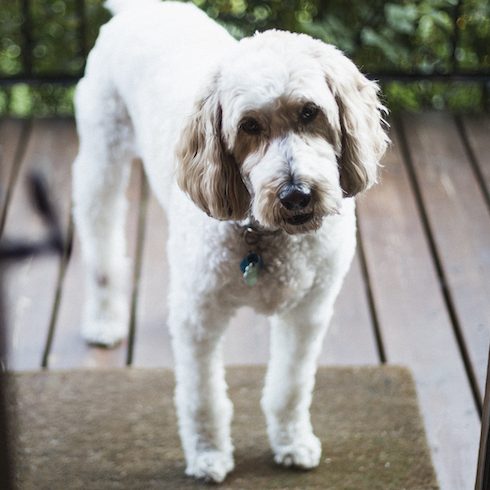
Front Door Etiquette
Many pet odours can be traced back to what your animals bring in from the outdoors. Keep a cleaning solution, like a pack of wet wipes or towels, at the front door. This will remind you to wipe muddy, dirty paws after a long walk or backyard playtime.
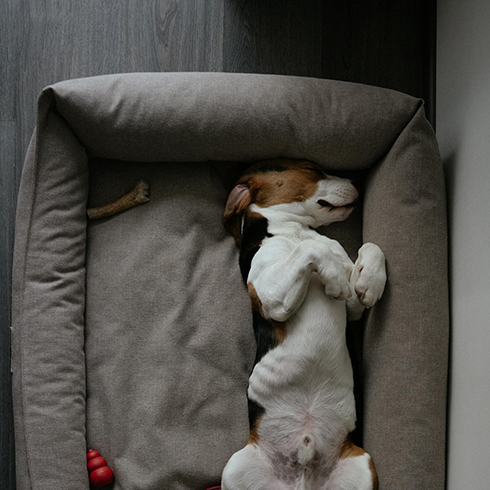
Pet Paradise
When it comes to how to manage the smell of pets in your home, prevention is key. By creating a designated spot for your furry friend to nap, eat and play, you can avoid smells travelling to every surface of your home. Plus, your pet will appreciate having a safe space just for them. Dog beds, cat tents and pet sofas, all make wonderful additions to your home’s design and functionality.
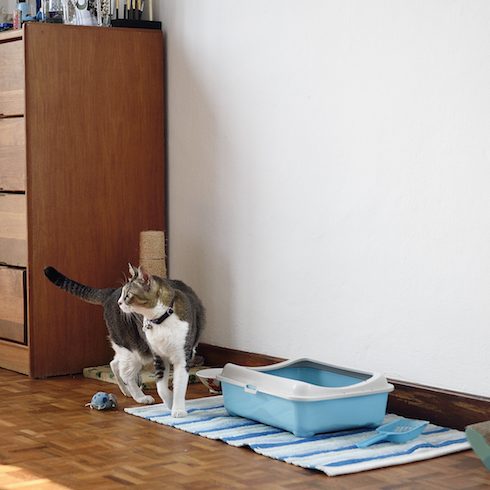
Clean the Litter Box
The litter box is often the main character when it comes to unpleasant cat smells in the home. To cut down on the scent, start by assessing your litter box hygiene. Scooping the box daily will do wonders for minimizing the nasty smells. But it’s also important to totally empty, scrub and wash the litter box (with soap and water) every month. If the box is clean but still smells foul, you can also try mixing a bit of baking soda in with the litter to help deodorize and absorb the odours.
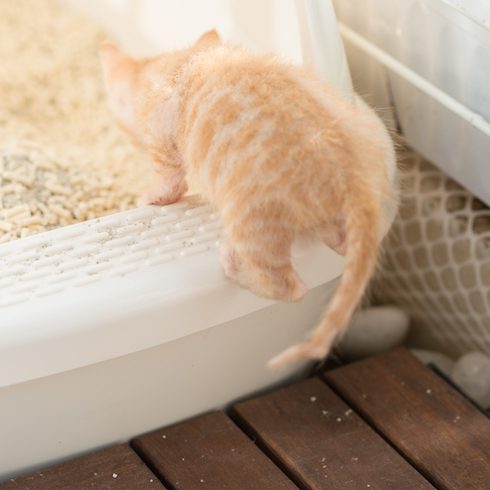
Purr-fect Placement
Another way to reduce litter box-induced cat smells in the home is to consider where you keep your feline’s litter box — placing it in a well-ventilated area is a good way to help keep smells from accumulating.
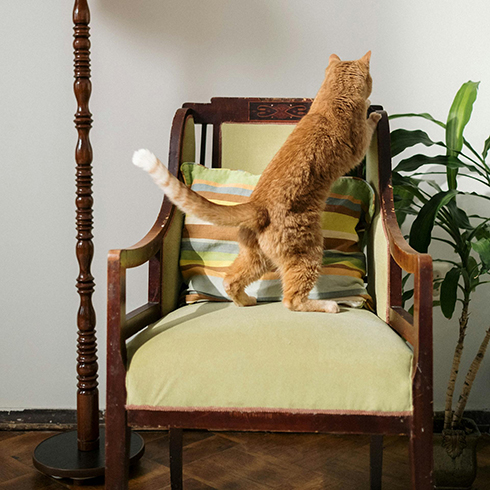
Get Rid of Cat Urine Smell on Surfaces
If you catch a whiff of strong cat pee smell, it’s likely not recent. The longer you wait to clean it up, the smellier it will get. And as our feline friends age, their urine becomes smellier.
To neutralize the odour, opt for vinegar or baking soda and an enzymatic cleaner. Yes, it may smell like vinegar for a couple of days, but when that clears, so will the distinct urine smell. If your furry friend can smell it, they are likely to repeat the pattern in the same spot.
Pro Tip: Avoid products that contain ammonia, as they will replicate the smell of cat urine and inspire your cat to mark their territory wherever it is used.
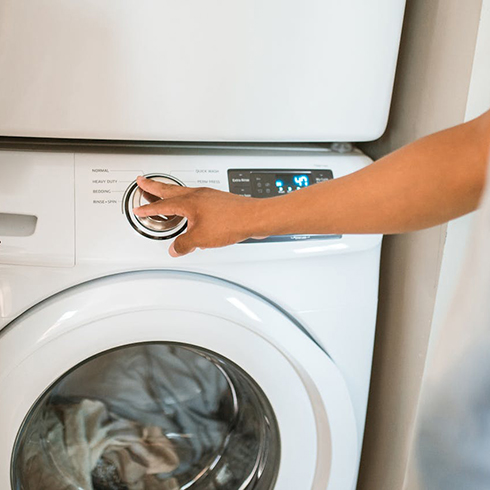
How to Get Cat Urine Smell Out of Clothing
If you’ve left a laundry basket around that was mistaken for a litter box, do not panic—and do not reach for the bleach. When bleach is mixed with the ammonia found in cat urine, it can create harmful gases.
Start by rinsing the spots with cool water before adding the items to a separate load in the washing machine with a cup of baking soda (yes, it really is a pet owner must-have) and detergent. If you don’t have baking soda, you can also use cider vinegar.
Air dry the items after washing, as the heat of the dryer can lock in the smell if it’s not fully removed. If the smell persists, rewash using the same process.
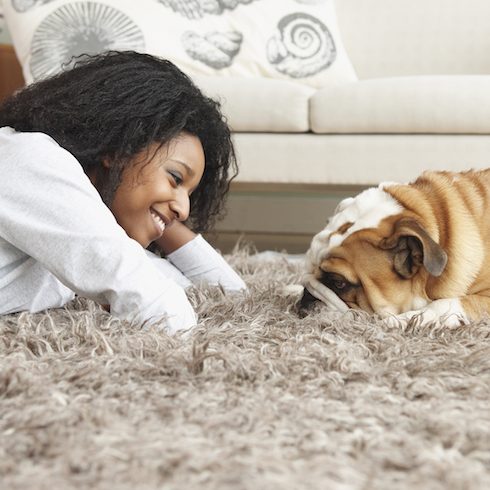
Sprinkle Baking Soda
Beyond litter boxes, baking soda is a useful natural deodorizer for other areas of your home that are suffering from unpleasant pet smells. Refresh your rugs and fabrics by sprinkling baking soda on them and letting them sit at least 15 minutes. The longer you allow the baking soda to sit, the better it will be able to neutralize odours and absorb oils. If needed, let baking soda sit overnight before vacuuming.
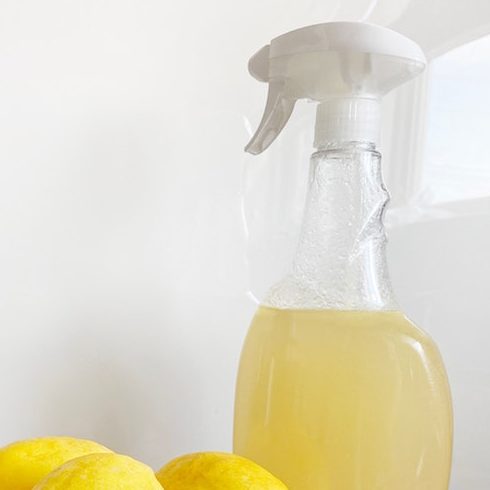
Wipe Up the Messes
Little puddles on the floor can lead to big, bad smells in a room. Be sure to wipe them up as soon as you see them. Expediency is the most important thing when it comes to getting rid of pet smells in your home.
White vinegar is a good non-toxic, pet-friendly solution. Mix white vinegar with lemon juice and water to tackle pet accidents and spills.
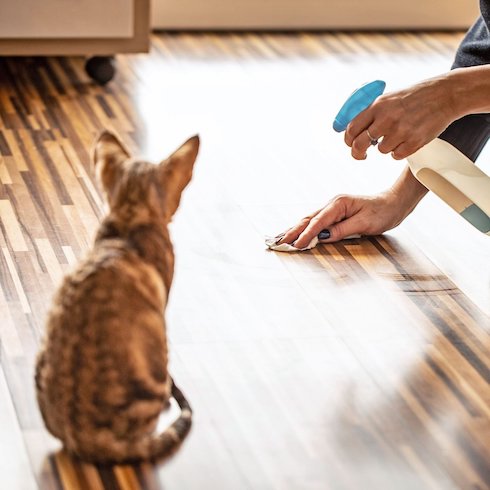
Consider Enzyme Cleaners
For more pungent pet scents on your home’s surfaces, pick up a cleaning product that utilizes enzymes. Enzyme cleaners release beneficial bacteria that can effectively “eat” odour-casing matter on surfaces, neutralizing the offending smell.
Pro Tip: Enzyme-based cleaners are the best at removing the stubborn smell of urine, making them one of the more reliable bathroom cleaners.
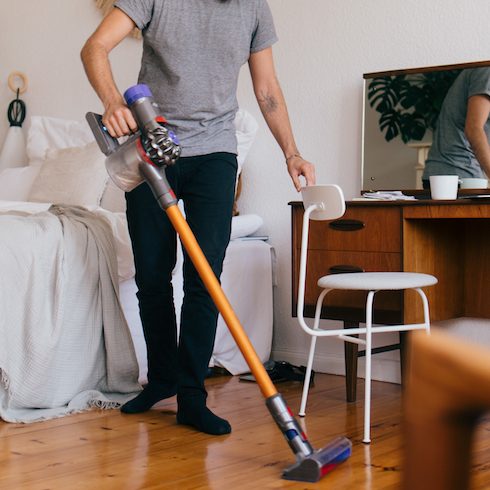
Vacuum Often
Whether you can see visible fur or not, if you have a pet, it’s important to vacuum your carpets, floors and furniture regularly. Vacuuming sucks up pet hair and dander to help ensure pet odours are at a minimum.
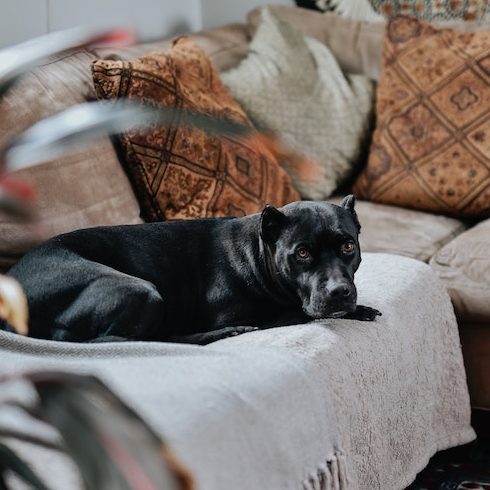
Make Throw Pillows Your Friend
You may think gifting in a pillow and throw blanket to the furry friend in your life is a bit extra, but in reality it will be a gift for you too. Deep cleaning your home’s upholstery weekly isn’t always realistic — invest in some washable solutions for your pet. Not only will your four-legged family member love to cuddle up on their new cozy pillows and blankets, they will spend less time in direct contact with the surface of your furniture. To keep unwanted scents at bay, designate a load of laundry per week to pet-specific linens.

Remove the Covers
Dogs and cats love to snuggle up on your comfy furniture, which means couches and other cozy seats tend to be prime targets for offending scents. If you can, remove the covers for your couch, chair cushions and other furniture and wash them as often as possible to cut down on odours.
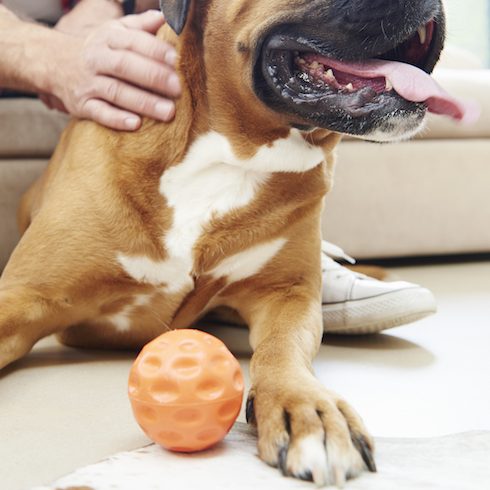
Tackle the Toys
Dirt, spit and slobber: Dog and cat toys are keepers of pet odour. Soak hard toys in a sink or bucket of hot water with 2-3 cups of white vinegar. Rinse off once water has cooled. If they’re particularly dirty, give them a scrub with a kitchen sponge and some dish soap, and then rinse off.
For durable soft toys, you can try throwing them in the washing machine (use the gentle cycle and either no detergent or a mild, fragrance-free, pet-safe one). For not-so-durable soft toys, give them a brief soak in hot water and vinegar, roughly 20 minutes, and then scrub gently by hand with some mild soap.
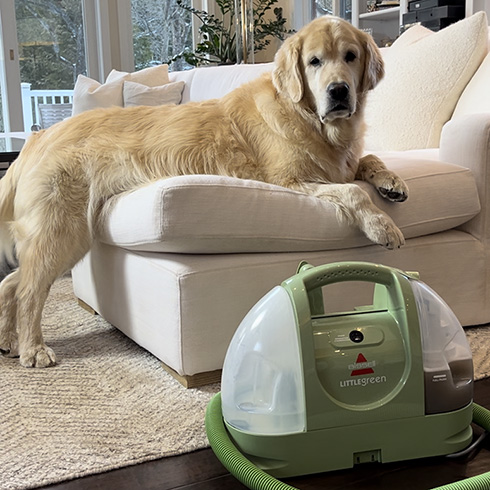
Deep Clean Upholstery
If you can’t remove the covers on your pet-scented furnishings, you can also do a periodic deep clean using an upholstery cleaning machine. You can buy or rent a machine, or consider hiring a professional to come in and steam clean your carpets and furniture.
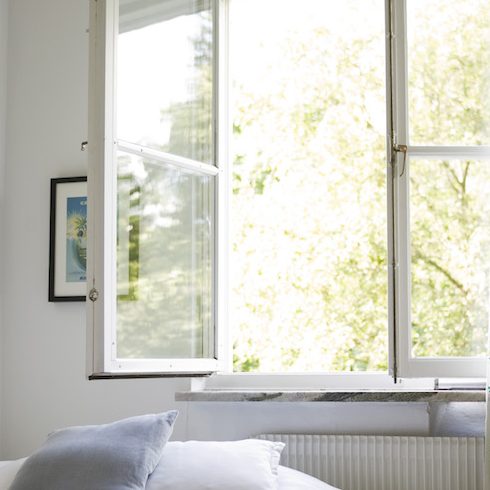
Clear the Air
Good air flow goes a long way towards sweeping out pet odours. If you can, occasionally open all the windows in your house to air things out (be careful to ensure your indoor cats don’t accidentally get out). If your home has an air filtration system, be sure to regularly replace the filters on time (make calendar events in your phone to help you remember) and have home air ducts cleaned.
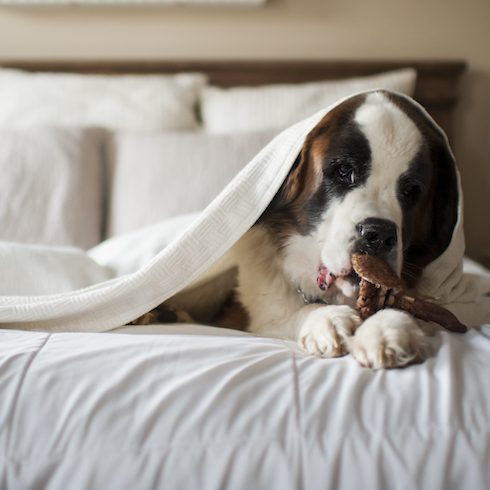
Scent-sational Sleep
Washing your sheet frequently is recommended, but especially if you have a pet that likes to share the covers. Strip your bedding and wash linens with a pet-friendly detergent weekly. While you’re waiting for the wash, vacuum your mattress and headboard thoroughly — trust us.
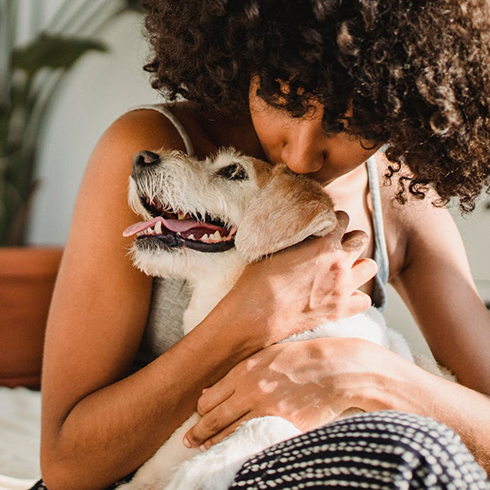
Fresh Friends
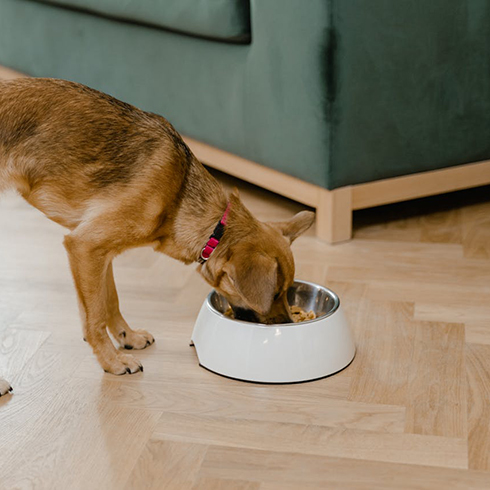
Dish Polish
Slobbery bowls are a big source of unpleasant pet smells — wash your pet’s water bowls daily to prevent any lingering odours. Your four-legged friend’s food bowls should be washed after every use (just like your own bowls). To make this practice easier, invest in a few dishwasher-safe bowls per pet.
HGTV your inbox.
By clicking "SIGN UP” you agree to receive emails from HGTV and accept Corus' Terms of Use and Corus' Privacy Policy.




